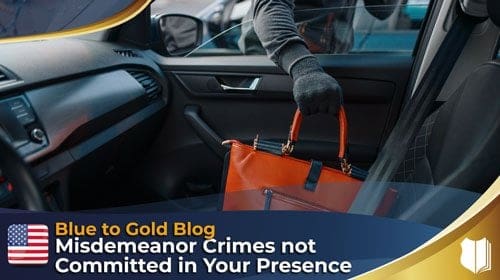

What is the Motor Vehicle Exception?
The automobile, or motor vehicle exception allows officers to search cars for evidence, contraband, and fruits or instrumentalities of crimes without a search warrant. When
or use our live chat
Customer Service


Our next topic is: How do you handle misdemeanor crimes that are not committed in your presence?
Many states have a misdemeanor restriction that you cannot make an arrest for a mis-demeanor that was not committed in your presence. Now, all of those states that have this restriction also have some exceptions. For example: DUI, not committed in your presence, domestic violence, not committed in your presence. You can still arrest for those, even though they’re misdemeanors. But they still have this common law rule that if you didn’t see it with your own senses, then you have to go another route.
So I want to give cops some tools to use to address those situations that come up frequently.
Before I dive in with those tools, let me give you the scenario.
Officers get a call that a victim had her purse stolen. They arrive 30 minutes later. They have a suspect description. They see the suspect a few blocks from the place where this purse got stolen. Now this is not a strong arm robbery. This was simply that the lady was on her phone and she’s not paying attention. She’s at an outside cafe. And the guy just comes up and grabs the purse and leaves. Then she realizes her purse is gone. So this was not a strong arm robbery or theft.
Now in Florida, do we have a felony? A felony is $750 or more in value. The victim says the purse is worth about $450, with not a lot of contents that are worth anything inside the purse. She’s claiming a loss of approximately $450. So we’re in the misdemeanor level.
Now they also have video of him behind some bushes at a school. They go behind the bushes, they find the purse, and they find the person. Here’s where we’re at; can we make the arrest or not? If we can’t make the arrest what are we supposed to do?
Well, let’s address a few things. I think you’ll find this interesting.
Number one, this question comes up a lot. Can we use the video of him stealing? Let’s say we have him on video stealing the purse, and we have him detained. Cops at the cafe see a video of him stealing the purse. Does that count as committed in your presence? And the answer is “no.” In order to be counted as committed your presence, you have to use some of your God given senses, hearing, sight, smell, and so forth. That can count as in your presence. But watching a video doesn’t count.
Now watching a live video does count. Make sense? You’re watching the guy commit a crime on let’s say, a closed circuit television. He’s stealing stuff and you’re watching with your own eyes. That is committed within your presence. That makes sense.
So we do not have that satisfied here in this scenario. Therefore, this arrest if we did arrest him, would violate Florida State statute.
I’m just letting you know that it does not violate the Constitution. It violates the law. And what the consequence of that is, I don’t know. It depends on the Supreme Court in your state. Some Supreme Courts, like in California, if this happened in California, even though they have the same “in your presence requirement,” they would not suppress the evidence, but other states may. So what are you supposed to do here?
Well, the main thing is to cite him. This “committed in your presence requirement,” does not prevent you from citing this person and releasing him. So get their name, get their ID. If they don’t want to give you their ID, you can arrest them under your appropriate state law for failing to identify when you have probably cause. But what about the evidence? What if we got him on video putting this lady’s stuff into his pockets?
Now we don’t have a crime of violence. So we don’t do a pat down necessarily. He’s being cooperative. He’s in handcuffs, for example. I don’t feel comfortable patting him down, because he’s not armed or dangerous. But what about that stuff that I know is in his pockets? And I say, if it was me, get it. Why? Because you have exigency. I’ve never seen a case that has held that if you have probable cause that they have possession of stolen property on their person, that you have to arrest them and bring them to jail to recover the property. You can recover it on-scene, because you have exigency.
You don’t have time to go get a warrant, and your probable cause is that they have stuff in their pockets. That is evidence. You recover the evidence. And I would cite and release him. And that’s what I would do.
Now, another option is getting a warrant for the guy on-scene. Florida has a law that allows a state’s attorney to issue an arrest warrant, based on the verbal probable cause that the cop gives over the phone and. I’ve also learned that Utah can get warrants from their cars. So that’s another thing. Get judicial approval. It may take a long time, but that’s just the way Florida has worked out.
So if you want to arrest him, go get the warrant on-scene if you can. If not, then you have limited options. But that’s kind of where we’re at on this.
And then a little zinger on this one is that, at the end of the day, the victim doesn’t even want to press charges, because she ended up getting her purse back. Because again, it was found behind some bushes at a school. So at that point, I’m kicking him loose. She just won’t be a victim and cooperate. The case is weak at best and she’s probably not going to show up at court.
To recap, many states require the “committed in the officer’s presence,” to make the arrest. That means you’re using your God-given senses. Watching a past video doesn’t count. Watching a live video does. If you have probable cause that they have evidence on their person, you’re going to be able to recover the evidence in the vast majority of states. I’ve not seen where you can’t, especially under those circumstances. Recover the evidence, cite and release him. If you’re really looking for an arrest, you’re going to have to go the warrant route.
Does that help? I hope it does. Thank you for your interest!


The automobile, or motor vehicle exception allows officers to search cars for evidence, contraband, and fruits or instrumentalities of crimes without a search warrant. When


These three golden rules come from reading thousands of court cases over the last 20 years and seeing a theme regarding what the courts are


This question is: Can you look inside a woman’s purse, or a man’s backpack during a pat down? The answer is, “Maybe.” Here’s how this


Here is the question: Can an officer reach slightly into a person’s home to pull them out and arrest them? If an officer has probable
© Blue to Gold, LLC. All rights reserved